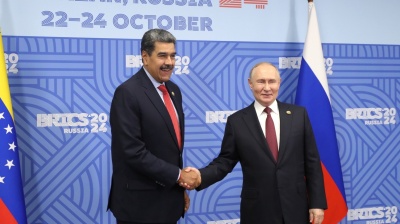Brazil's chief presidential adviser Celso Amorim has expressed opposition to Venezuela's bid to join the BRICS economic bloc, citing concerns about maintaining the group's "special nature" and international influence.
"I am not in favour of Venezuela joining. I think we need to go slowly," Amorim told CNN Brasil, warning against expanding the group too rapidly. "There is no point in filling BRICS with countries, otherwise a new G-77 will soon be created."
The comments come as BRICS members meet in Kazan, Russia. The bloc, which represents about 46% of the world's population and over 36% of global GDP, currently includes Brazil, Russia, India, China, and South Africa, plus new entries Egypt, Ethiopia, Iran and the United Arab Emirates. Remarkably, Saudi Arabia has yet to ratify its membership after being invited to join last year, while several nations, including Cuba, Turkey, Azerbaijan, and Malaysia, have expressed interest in accession.
The statement reflects growing tensions between Brasilia and Caracas following Venezuela's disputed July 28 elections, where electoral authorities declared President Nicolás Maduro the winner. Brazilian President Luiz Inácio Lula da Silva has not recognised either Maduro's win or opposition leader Edmundo González Urrutia's claim to victory.
Amorim, who met with President Lula on October 21 at the Palácio da Alvorada, emphasised the need for strategic consideration in admitting new members, particularly given the current global climate. "Remember that the world is experiencing wars with the potential to become world wars. So admission criteria are more important than the country itself," he said.
Foreign Minister Mauro Vieira, who is leading the Brazilian delegation at the BRICS summit after Lula cancelled his attendance due to a domestic accident, took a more diplomatic stance, stating that "all candidate countries have options" to become part of the group.
Amorim rejected suggestions that BRICS has adopted an increasingly anti-Western agenda under Chinese and Russian influence. "The strengthening of the BRICS helped to revive the G20, and in this way contributed to the balance of power," he told Estadão. "We need a more peaceful, multipolar and balanced world."
The veteran diplomat's opposition to expansion appears to extend beyond Venezuela. Without naming specific countries, Amorim stressed that "BRICS has to preserve its essence as significant countries with influence in international relations."
Brazil's relationship with some potential BRICS candidates has been particularly strained. The country recently broke diplomatic relations with Nicaragua after the government of President Daniel Ortega took offence at Brazil's absence from the anniversary of the Sandinista Revolution.
Amorim's recent attempts to mediate Venezuela's electoral crisis, including a proposal to repeat the July elections, have met with limited success, with opposition groups rejecting the suggestion on the grounds that the people's will has already been expressed at the polls.
In an apparent bid to quell rumours, Kremlin spokesman Dmitry Peskov said on October 22 that there would be no expansion of the BRICS group of nations during this week's summit in Kazan. Instead, the bloc is reportedly exploring options for associate membership through the introduction of the category of “partner states,” which could include up to 40 countries in the BRICS+/Outreach format. Peskov’s remarks indicate that bloc members still hold vastly differing positions on the group’s potential enlargement.
This comes as a blow to Venezuelan President Maduro, who arrived in Kazan last night to join a delegation consisting of Vice President Delcy Rodríguez and Foreign Minister Yván Gil. Speaking to the press upon his arrival, he confirmed his country is particularly interested in BRICS’ financial projects, such as the establishment of an alternative to the SWIFT banking system.
“We will try to build an economy that is not based on sanctions, blackmail, or economic coercion, but rather on cooperation, truly free trade, shared investment, and new technology,” Maduro stated. He is set to meet Putin on October 23 on the sidelines of the gathering.
In August, Gil announced that Venezuela was actively participating in all BRICS group meetings and was "merely awaiting formal admission into the bloc," while Maduro warned the United States and its allies that he might transfer oil and gas blocks operated by Western oil companies to BRICS countries.
News

Ukraine’s elite HUR forces turn the tide in the battle for Pokrovsk, as Russia’s effort to capture key logistics hub fails
The battle for Pokrovsk became intense early on November 1and it looked like the fall of the key logistics hub to Russia was imminent. But a bold counterattack by Ukraine’s elite HUR forces seems to have turned the tide.

US prepares attack on Venezuela as Maduro begs Putin for aid
The Trump administration has reportedly drawn up a list of potential military targets within Venezuela as part of its intensifying pressure on President Nicolás Maduro, who has turned to Moscow seeking urgent military assistance.

Bulgaria suspends fuel exports to EU after US sanctions Lukoil
Bulgaria has temporarily suspended exports of petroleum products to European Union countries after the United States imposed sanctions on Russian oil giant Lukoil.

Tens of thousands rally in Serbia's Novi Sad one year after deadly station collapse
Tragedy that killed 16 people has become a symbol of public anger over corruption and negligence, fueling Serbia’s largest protest movement in more than a decade.

